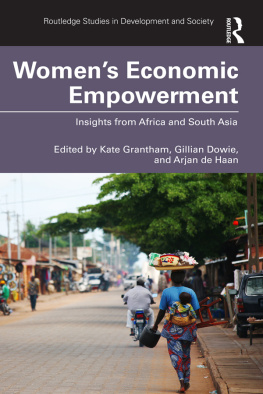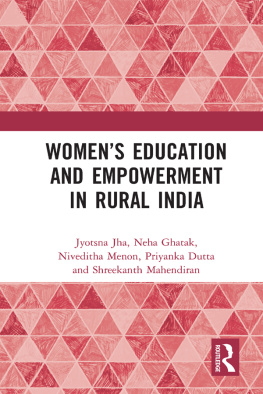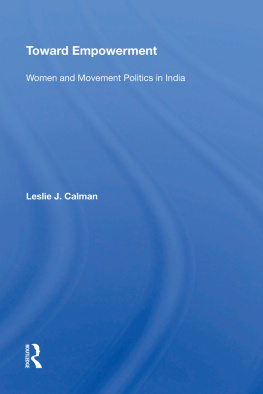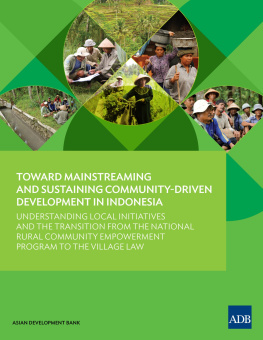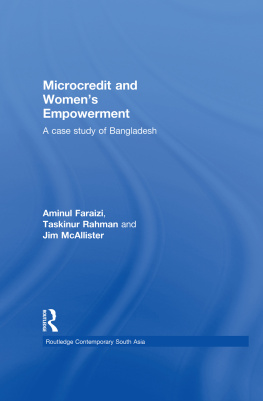
Womens Empowerment in Indonesia
The idea that development projects in poor countries are most effective when they harness the agency of women is a well-known theme. Most studies of womens agency in such projects, however, focus on the role of non-governmental organisations in facilitating womens agency. This book, on the other hand, based on extensive original research, explores how women can effectively mobilise themselves on their own initiative. The book considers poor people in informal settlements in Jakarta, where government schemes for modernising the city have often led to forced evictions. The book examines different groups of women, analyses how they have challenged oppressive authority their husbands, community leaders and local governments and provides detailed insights into womens attitudes and what has motivated them. Overall, the book provides a rich picture of womens empowerment and disempowerment.
Sri Wiyanti Eddyono is a lecturer and Director of the Law, Gender and Society Research Centre, Faculty of Law, Universitas Gadjah Mada, Yogyakarta, Indonesia. She is Collaborating Researcher for Monash Gender, Peace and Security Centre, Monash University. She completed her doctorate at Monash University, Australia.
ASAA Women in Asia Series
Editor: Louise Edwards (University of New South Wales)
Editorial Board:
Hyaeweol Choi (The Australian National University)
Michele Ford (The University of Sydney)
Trude Jacobsen (Northern Illinois University)
Lenore Lyons (Independent scholar)
Vera Mackie (University of Wollongong)
Anne McLaren (The University of Melbourne)
Mina Roces (University of New South Wales)
Dina Siddiqi (The City University of New York)
Andrea Whittaker (The University of Queensland)
Founding Editors: Susan Blackburn and Lenore Manderson
Womens Empowerment in South Asia
NGO Interventions and Agency Building in Bangladesh
Pranab Panday 2016
Women and the Politics of Gender in Post-Conflict Timor-Leste
Between Heaven and Earth
Sara Niner 2016
Sex Trafficking in Southeast Asia
A History of Desire, Duty and Debt
Trude Jacobsen 2016
Women, Work and Care in the Asia-Pacific
Edited by Marian Baird, Michele Ford and Elizabeth Hill
Marriage, Gender and Islam in Indonesia
Women Negotiating Informal Marriage, Divorce and Desire
Maria Platt
Comfort Women and Post-Occupation Corporate Japan
Caroline Norma
Womens Empowerment in Indonesia
A Poor Community in Jakarta
Sri Wiyanti Eddyono
For more information about this series, please visit: www.routledge.com
First published 2019
by Routledge
2 Park Square, Milton Park, Abingdon, Oxon OX14 4RN
and by Routledge
52 Vanderbilt Avenue, New York, NY 10017
Routledge is an imprint of the Taylor & Francis Group, an informa business
2019 Sri Wiyanti Eddyono
The right of Sri Wiyanti Eddyono to be identified as author of this work has been asserted by her in accordance with sections 77 and 78 of the Copyright, Designs and Patents Act 1988.
All rights reserved. No part of this book may be reprinted or reproduced or utilised in any form or by any electronic, mechanical, or other means, now known or hereafter invented, including photocopying and recording, or in any information storage or retrieval system, without permission in writing from the publishers.
Trademark notice: Product or corporate names may be trademarks or registered trademarks, and are used only for identification and explanation without intent to infringe.
British Library Cataloguing-in-Publication Data
A catalogue record for this book is available from the British Library
Library of Congress Cataloging-in-Publication Data
A catalog record for this book has been requested
ISBN: 978-1-138-56357-5 (hbk)
ISBN: 978-1-315-12180-2 (ebk)
Typeset in Times New Roman
by Apex CoVantage, LLC
This book presents a case study of womens empowerment in Indonesia that examines how women in one informal settlement (slum) in Jakarta, Kampung Rawa, resist house eviction. It also examines how governments, NGOs and leaders in the community could assist or impede womens empowerment.
In Jakarta, house evictions have been conducted for over 50 years as part of municipal government policies for modernising the city. They particularly target poor people living in informal settlements without title to land, and acutely affect women. This study examines how womens empowerment and disempowerment occur in the process of struggles to prevent eviction in different urban political contexts under three governors of Jakarta in the New Democratic era: Sutiyoso, Fauzi Bowo and Joko Widodo.
This book defines womens empowerment as a process of creating space for women to expand their agency in order to challenge oppressive power. Most studies assess womens empowerment as operationalised within intervention programs conducted by NGOs, government officers or other development agencies. By contrast, I analyse whether the desire to resist the demolition of their homes and their roles as mothers encourage women to intensify their agency.
This study exposes the diversity of womens situations, their agency and their strategies in preventing eviction. Although they live in one informal settlement, Kampung Rawa residents are divided into three groups, each with different characteristics. They have faced different layers of power that oppress them in everyday life: husbands, community leaders and local governments. However, womens agency is strongly evident through different kinds of resistance in their daily life, as individuals and through the adoption of more collective strategies, both subtle and more visible. The dynamics of their agency are influenced by several factors: their own perception of problems and the way they interpret their roles as mothers and wives, their relationship with their husbands, government attitudes and policies and their interaction with NGOs and leaders in their own community. These different interactions have created more available spaces for them to increase their agency but also have obstructed their agency. Thus, this study concludes that womens struggles in combating eviction facilitate their empowerment even as they experience disempowerment.
Key words : womens agency, womens empowerment, eviction, informal settlement, Indonesia
This book is a revised version on my PhD thesis, which I completed at the School of Social Sciences, Faculty of Art, Monash University, Australia. I wish to express my gratitude to my main supervisor, Associate Professor Susan Blackburn, whose support and expertise has guided me in conducting research and in the writing process. Her companionship and passion from the beginning until the end of my study is very remarkable, motivating me to work harder, making me feel that I could do what was required and encouraging me to publish my thesis. Special thanks to Dr Penny Graham and to Dr Samanthi Gunawardana, my second supervisors, and to my examiner panels Prof. Julian Millie, Dr Michael Janover, Dr Narelle Mirragliota and Dr Antje Misbach. Many thanks to Dr Kate Cregan (GRiPs-Monash University), Dr Julie Ham (the University of Hong Kong), Dr Neneng Lahpan, Barbara K. Trojanovska, Yasmin Chilmeran and Maria Tanyang, who assisted and supported me through writing group. Thanks to Wendy Miller for proof reading and to Syahruddin Yadi for his contribution to modifying a digitalised map of Kampung Rawa.



